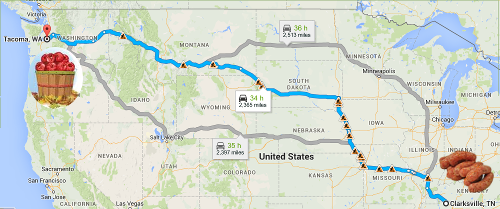
Decide what you want to do. There are several factors into choosing what industry you want to support and what equipment you wish to use or will be required to have. Before choosing the industry you wish to support you first have to ask several questions.
1. Do I have any physical limitations (bad back, afraid of heights, limited mobility, etc.)?
2. What industries do I want to work with and are they located where I live? If not, do I live in their shipping lanes?
3. Am I willing to be OTR, regional or local?
These are only 3. There are many more depending on your particular situation. These questions will require some modifications and additions for every individual wanting to operate their own trucking business.
When it comes to selecting the equipment for the industry you choose it comes down to nothing but good old common sense. Simply put, if you wish to haul cattle it wouldn't be wise to put a load of cattle on a flatbed. You will also need to check with your customers or potential customers prior to purchasing your equipment. In some cases customers are known to have minimum requirements for their carrier's equipment such as weight, age, mileage, annual DOT inspection from their preferred provider, etc.
Always do market (customer) research. Your research can be the difference between a solid business relationship with your customers and an absolute disaster. One of the first things you will want to determine is how long has this potential customer been in business? New businesses frequently rely on loans, investor capitol or personal money to operate. Thus their financial stability could come into question if they have any difficulties with their cash flow from slow or no payment from their customers. I always urge caution when working with a new business.
Next you will want to know if they have lost all their direct carriers and have begun to rely on brokers. This is a clear warning sign. Either the business needs to cut costs and believes using a broker can help do that or the business has not been able to pay its carriers or possibly both. Either way it could be a business you would be better off to steer clear of.
Once you have decided to do business with a customer you will want to determine the consistency of customer's shipments. This will give you an advance notice of the amount of work you can expect from your new customer and if you will need to continue looking for additional customers to fill in any gaps between their shipments.
The lanes of your new customers shipments are important to know as early as possible. You can then determine the rate you will need to haul the loads for as well as begin the search for a new customer at the loads destination.
Finally, rates. Most all potential customers will ask you about your rates before the conversation is allowed to go beyond the standard meet and greet introductions. So be prepared with your rates for all lanes prior to meeting any potential customer. Be flexible as they will almost undoubtedly respond with a counter offer. Above all during this negotiation remember you are attempting to enter into a business agreement that will make the potential customer save more and/or make more money while being profitable yourself. If you are not able to come to terms it's not because the customer is unwilling. It's because they are being financially responsible. Remember to be professional, respectful and kind. They may call you back in a couple of months!
